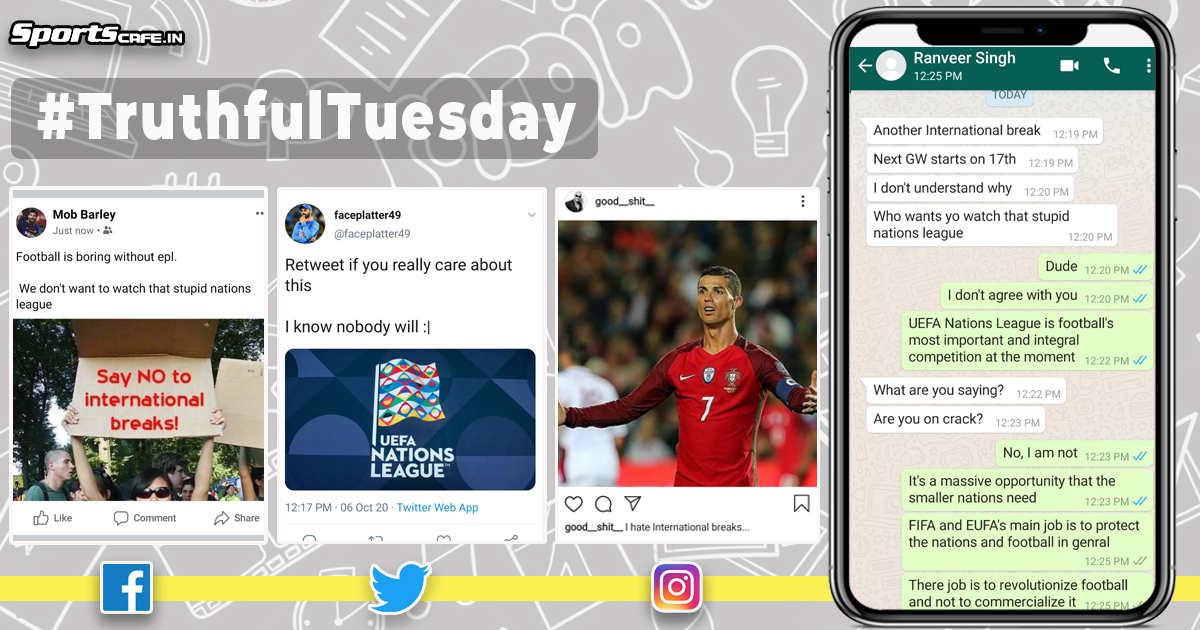Truthful Tuesday | The Nations League is football's most important and integral competition right now

With world football on a break, the focus has shifted to a fourteen-day holiday from club football as the 2020 transfer window comes to an end. But in this week’s edition of Truthful Tuesday, we look at the international break and say that the Nations League is football’s most important competition.
Open Twitter, search for the UEFA Nations League or the Nation League or even the words the international break and you’ll see the hate. It pours from every possible crevasse it can with what seems like a never-ending barrage of hate at the two-week holiday. Well, normally the international break gets hate because no one ever seems to like watching countries play against each other.
Well, that is, outside the Euros, the World Cup or any other international tournament and even then there are many who clamber for the glory that club football brings. But now? In a football season that takes place side-by-side with a coronavirus? In a football season that is so condensed that teams are playing three games per week before the actual group stages of UEFA’s premier European competitions even start? People absolutely abhor it despite the fact that there are quite a few mouth-watering clashes going about.
Portugal vs Spain, England vs Wales, Denmark vs Sweden, the Netherlands vs Spain and the list just goes on and on and on. It’s a great mixture of elite athletes battling against other elite athletes but even then people continue to spew hate against it. Yet, the kicker is the fact that the Nations’ League is the most important part of football right now. Hell, it might even be, outside the leagues, the most important competition in world football right now.
It’s an opinion that’s as unpopular as time especially given the amount of criticism that the competition earned themselves when they first started out. There was a staggering amount of bafflement at the fact that UEFA wanted to find a new way to make more money than ever before. So much so, that they looked towards monetizing international football by doing the one thing that attracts every Tom, Dick and Harry to the screen; by making it a proper competition.
From there was born the Nations League and it didn’t start well. Critics, fans and Twitterattis didn’t like it but a year, or so, later and the world was enlivened by the action and more. Portugal, on the back of that man’s hattrick, lifted the first-ever one and just like that the world was in love again, because UEFA had found their solution. It brought a balance, proper footballing action with the biggies of international football up against each other for yet another trophy.
By the end of it all, England earned themselves €10 million in prize money and that’s the reason why it’s so important especially now. Now, in a pandemic where money is tight, very very tight. So tight that Barcelona, who were hoping to break a €1bn in revenue last season, announced losses of €97 million. That’s right, the very same Barcelona with them losing an incredible €47 million in matchday income. Now imagine if Barcelona’s matchday losses account for more than half their total losses, imagine the situation for the other clubs.
The smaller sides. The sides that depend on matchday income, the sides that don’t have the kind of marketing power that a club that posses that man have. Manchester United, are set to report losses of more than €75 million and they’re a marketing giant no matter where you are. Juventus, with that man, reported €71 million in losses. So, imagine the destruction the coronavirus, with closed doors football, did to the smaller sides.
Now imagine what happened to the smaller countries that play international football. The kind of losses that they incurred. The Finlands, the Norways, the Scotlands, the Kosovos, the North Macedonians and so on. Football is set to face a staggering collection of losses across the world and for the smaller nations, especially ones that may never attract massive crowds, this could potentially mean the end of footballing programs. The end of grass-roots programs that effectively build young kids from the ground up into the Messis, Ronaldos, De Bruynes, Salahs and so on of the world.
The end of futsal, the end of non-league football for many, the end of semi-pro football for some and possibly, for a select few, the end of pro football. A bleak prospect in indeed and maybe a slight over-exaggeration but make no mistake, that’s the direction things are heading right now. That’s what a global pandemic does to the world and there is nothing UEFA, the Union of European Football Associations can do about the world. But they can very well change things for the European Football Associations, otherwise what’s the use of adding it to their name?
Back to the Nations’ League, how does this change things? Last season’s edition saw England earn between €8 to €10 million, give or take, and they finished third but for them that money was a drop in the bucket. On the other hand, Finland, Norway and Scotland earned around €2.25m from the tournament last time, in solidarity payments and prize money. For them, that money was a godsend although that applies more to the national associations of Belarus, Georgia, Kosovo, North Macedonia and so on who each received €1.5m.
That’s last year and if reports are right then that figure could, possibly not, increase although given the climate it won’t be by much. For many of those nations, even though the increase isn’t by much, this is one of few real sources of incomes they’ve got to help improve their programs. These are not countries, who by any means will be consistent at either the Euros or World Cup. This might be all they have which makes this situation even worse for them and even then, UEFA has a responsibility to the national associations to keep them running.
To help them out when they’re in trouble and right now they’re in trouble. They’re in trouble of losing a lot more than just football and for UEFA, that should be the top priority which it clearly is. There are, however, concerns that the players will struggle to cope with the intense year or so of football that they’ve got ahead of them and that should be a concern. It’s why UEFA have scheduled the competition the way they have but there is absolutely nothing they can do about the rest.
The scheduling of the leagues, and other cup competitions, are out of their hands and placed in the hands of the football associations which is where the problem rises. Because in an incredible condensed and compressed season, did the Carabao Cup really need to be played? Did the DFL Supercup really need to be played especially when Bayern Munich won the treble?? Did the Community Shield really need to be played? The list goes on and on once again and yet the Nations League doesn’t fall in the same category.
However, player welfare has to be key, no matter what else happens and that could force national teams to test their reserves and see just how deep their squads actually are. Whether that’s a boon or a curse for international managers, we are yet to see and yet for the UEFA, and FIFA, they need to work towards finding a way to keep football alive in countries that don’t have the funds. Right now, they’re doing just that but given the financial impact of the coronavirus, it may not be enough.
